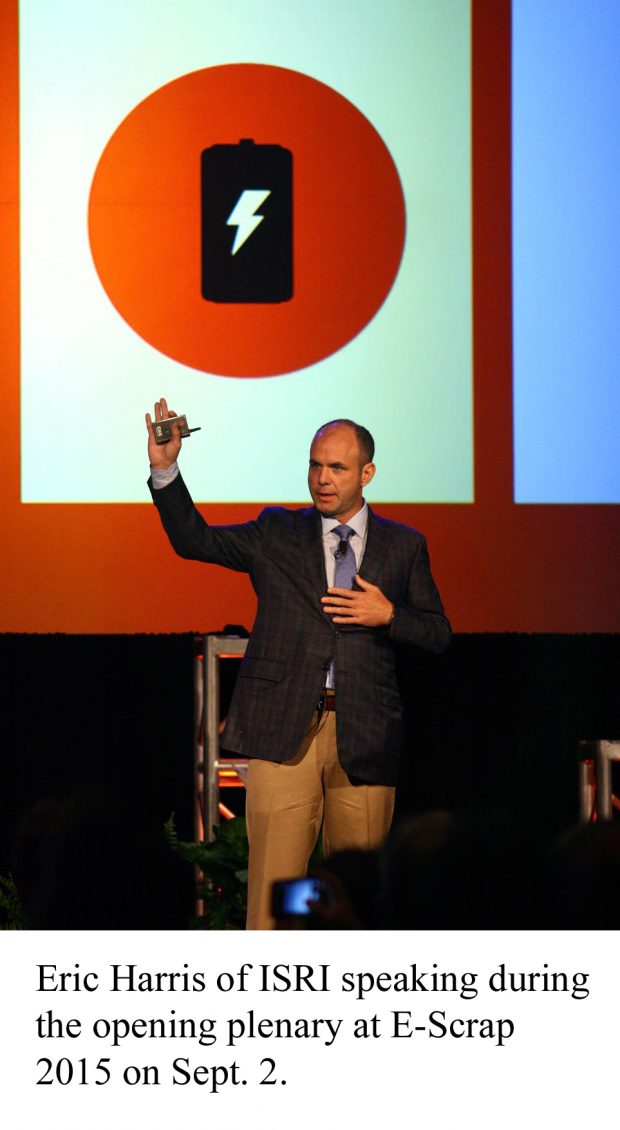E-Scrap News Magazine: Industry experts delve into market challenges
Industry experts delve into market challengesBy Dan Leif, E-Scrap News September 3, 2015 Pay close attention to your clients – and closer attention to your balance sheet. Those were the major takeaways from E-Scrap 2015's opening session, which aimed to help guide e-scrap professionals through a period defined by tight competition and historically low commodity prices. A number of resounding statements came from Eric Harris, director of government and international affairs at the Institute of Scrap Recycling Industries. He said too often e-scrap entities are setting themselves up for financial stumbling by saying yes to constricting contracts. "You can't pay six cents for a nickel," Harris said. "But that's what's happening across the board. Recyclers must be able to walk away from a bad deal." Given current market conditions, it's understandable why business managers may be open to agreements with negligible profit margins. Another of the presenters in the opening session, precious metals analyst Erica Rannestad of Thomson Reuters, explained prices for silver, gold and palladium are "at their nadir." She predicted prices to start seeing an upward creep in coming years, but she added the industry should not expect a big boom. E-scrap players, then, are being left to grow through other avenues. So it's little surprise they are aiming to pick up partners, regardless of price point. ITAD market expert David Daoud, another speaker at the session, said instead of focusing on simply increasing the number of customers being served, industry service providers need to rethink how they work with those partners they already have. Step one is simply being ready to handle the evolving stream of material. He said in coming years enterprise IT will be dominated by use of mobile and the cloud. "That's where the ITAD market will have to have skills." He also said the electronics recovery industry should work hard to market the value of certifications to enterprise clients. Daoud said research by his company, Compliance Standards, indicates just 25 percent of enterprise companies take certifications into account when considering ITAD options. He noted that was up from almost zero in 2012 but that room for growth exists. "It's going to be difficult if we just keep the [certification] debate among recyclers," Daoud said. "We need to open it up to the larger market, to end users." Still, the certification discussion within the e-scrap industry itself is continuing to evolve. ISRI's Harris talked at length about the decisions e-scrap certification standards are facing in regards to CRT glass. "A company that's certified should not be allowed to stockpile glass," Harris said. But he added that the funding of glass processing should also not be falling at the feet of e-scrap companies. "On the glass front, someone has to pay, but it's not going to be the recyclers," he said. "It's time to re-think state programs. They're not working for recyclers right now." |
 |
 |
|
To return to the E-Scrap News newsletter, click here. |
Source: Resource Recycling
E-Scrap News Magazine: Industry experts delve into market challenges
Industry experts delve into market challenges By Dan Leif, E-Scrap News September 3, 2015 Pay close attention to your clients – and closer attention to your balance sheet. Those were the major takeaways from E-Scrap 2015's opening session, which aimed to help guide e-scrap professionals through a period defined by tight competition and historically low commodity prices. A number of resounding statements came from Eric Harris, director of government and international affairs at the Institute of Scrap Recycling Industries. He said too often e-scrap entities are setting themselves up for financial stumbling by saying yes to constricting contracts. "You can't pay six cents for a nickel," Harris said. "But that's what's happening across the board. Recyclers must be able to walk away from a bad deal." Given current market conditions, it's understandable why business managers may be open to agreements with negligible profit margins. Another of the presenters in the opening session, precious metals analyst Erica Rannestad of Thomson Reuters, explained prices for silver, gold and palladium are "at their nadir." She predicted prices to start seeing an upward creep in coming years, but she added the industry should not expect a big boom. E-scrap players, then, are being left…


